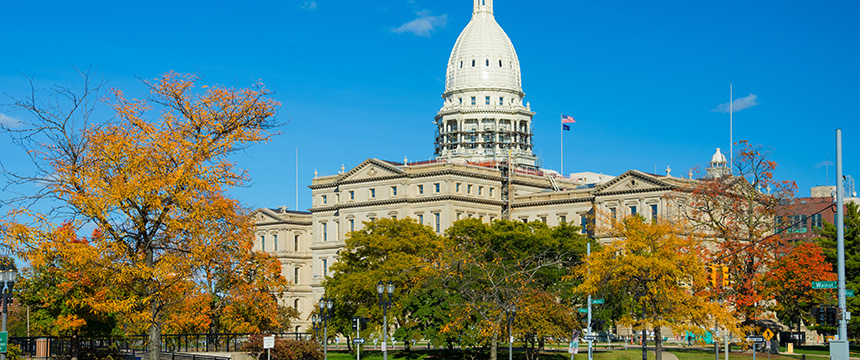Michigan Supreme Court Decision Spurs Widespread Changes to Government COVID-19 Response: Update for Week of October 12, 2020

This update highlights key changes occurring between October 10 and October 16, 2020 with respect to the State of Michigan’s governmental COVID-19 response. It additionally analyzes the likely impacts these changes will have on individuals and businesses as the COVID-19 pandemic continues.
As reported previously, on October 2, 2020 the Michigan Supreme Court invalidated legal authorities relied upon by Governor Gretchen Whitmer to unilaterally extend or declare emergencies in relation to the COVID-19 pandemic. (See In re Certified Questions from the United States District Court, Western District of Michigan, Southern Division (Midwest Institute of Health, PLLC v Governor) (the “Opinion”)). A summary of changes related to the Opinion occurring between October 2 and October 9, 2020 may be found here.
Since the publication of last week’s update, key developments include, (1) legislative actions which replace several of the Governor’s now ineffective orders; (2) regulatory orders issued by MIOSHA which are expected to significantly impact COVID-19 workplace safety requirements; and (3) judicial responses which clarify the impact and effective date of the October 2 Opinion. Each respective topic is discussed below in detail.
Legislative Actions and Updates
Throughout the week, the legislature moved a number of bills forward, which primarily address issues previously covered by the Governor’s now-invalidated executive orders. These include:
- SB 1108: Amending certain provisions of the Open Meetings Act (“OMA”). The bill was passed by the House and Senate and is expected to be signed by the Governor in the near future. Once effective, the amendments will allow public bodies to meet remotely under any circumstances before January 1, 2021, and under various circumstances – including member absence due to a statewide or local state of emergency – throughout 2021.
Passage of this bill is critical for local governments, school boards, and other public bodies who are required to comply with the OMA, and whose prior actions taken in remote meetings had been called into question. On Monday, the State Board of Election cancelled their meetings due to uncertainty regarding compliance with the OMA, which subsequently led to protesting members of the Board being denied access to the John A. Hannah State Office Building on Tuesday.
- HB 6159, HB 6030, HB 6031, HB 6032, and HB 6101: A package of bills providing coronavirus liability protections to businesses as well as healthcare workers. The package passed the House and Senate Tuesday and has been enrolled for delivery to Governor Whitmer for signature.
For businesses, passage of this legislation is critical as it provides comprehensive liability protection for employers in compliance with all federal or state laws, local rules or regulations, executive orders, or public health guidance. The healthcare bill will provide health care workers immunity from lawsuits stemming from services provided to patients in response to the pandemic, excluding worker’s compensation claims.
-
HB 6192: Provides an extension of renewal date for certain driver licenses during a declared emergency. For commercial and personal vehicles with registrations expiring on or after March 1, 2020 registrations will remain valid until December 11, 2020. The bill has been passed by the House and Senate and enrolled for signature by the Governor.
- SB 0911: Allows retirees from the Unemployment Insurance Agency or the Michigan Occupational Safety and Health Administration to be rehired without losing retirement benefits under certain circumstances. The bill has been passed by the House and Senate and enrolled for signature by the Governor.
- SB 0886: Expands unemployment benefits up to 26 weeks for certain employees during a declared state of emergency. The bill has been passed by the House and Senate and enrolled for signature by the Governor.
- SB 1094, HB 6137: Provides nursing home regulations related to the COVID-19 pandemic. SB 1094 prohibits the admittance of COVID-19-positive patients to nursing homes from another facility and allows for the creation of centralized intake facilities. HB 6137 provides additional requirements for certain homes for the aged and nursing homes dedicated as CARE facilities and residents who test positive for coronavirus. Both bills have been passed by the House and Senate and enrolled for signature by the Governor.
Regulatory and Administrative Actions
As discussed in last week’s update, immediately following the October 2 Opinion, MDHHS issued orders prohibiting certain gatherings, requiring face coverings, and requiring reporting for confirmed and probable COVID-19 cases at schools. Orders were also issued last week setting out safety guidelines for residential care, congregate care, and juvenile justice centers. No new MDHHS orders have been issued this week to date.
On October 14, 2020, the Michigan Occupational Safety and Health Administration (“MIOSHA”) issued emergency rules “to control, prevent, and mitigate” COVID-19 transmission among employees. Under the emergency rules, employers must:
- Develop a COVID-19 Preparedness and Response Plan,
- Implement infection prevention, health surveillance, and workplace control measures,
- Determine whether there is actual or reasonably anticipated employee exposure COVID-19 and assign risk categories to job tasks and procedures,
- Issue personal protective equipment to employees,
- Provide training to employees on SARS-CoV-2 and COVID-19, and
- Maintain records on required training, screening protocols, and notifications.
In addition, the emergency rules require employers to create a policy prohibiting in-person work for employees to the extent that their work activities can feasibly be completed remotely. Use of the word “feasible” in the emergency rule suggests a level of employer discretion for requiring employees to return to work, however, the limits of this discretion remains unclear. Employers should consider remote work protocols as an important tool for limiting exposure to workplace safety violations and consult with legal counsel when developing a COVID-19 Preparedness and Response Plan.
All Preparedness and Response Plans must be developed consistent with COVID-19 guidance from the U.S. Centers for Disease Control and Prevention (“CDC”) and the March 2020 publication entitled “Guidance on Preparing Workplaces for COVID-19” from the federal Occupational Health and Safety Administration (“OSHA”). Records must be kept for one year from time of creation.
In response to these new rules, the State of Michigan has also promulgated online resources for businesses, which include sample preparedness plans and re-opening checklists. Additionally, a new Dept. of Labor and Economic Opportunity Ambassador Program will send safety and health experts to businesses for education and support.
Judicial Actions
On October 5, Governor Gretchen Whitmer filed a motion Supreme Court to delay the Opinion’s effective date until October 30 to “enable an orderly transition to manage this ongoing crisis.” On October 12, this motion was denied. Writing in concurrence, Justice Bridget McCormack stated that the Michigan Court Rules did not provide authority for the Court to grant the remedy requested.
In a second decision issued October 12, the Court in House of Representatives v. Governor (Docket No. 161917) also peremptorily reversed a Michigan Court of Appeals opinion upholding the Governor’s executive actions. The Court’s opinion further confirmed that its order in the case would be effective upon entry by the Court of Claims. This decision creates conclusive state-level precedent and cements the conclusion that Governor Whitmer’s various executive orders and emergency declarations no longer carry the force of law. It is expected that many of the ongoing state and federal lawsuits relating to the Governor’s exercise of executive emergency powers will be dismissed in the coming weeks.
Even taking into account these final decisions, it remains unclear whether the Governor will face further litigation related to her COVID-19 response. In an October 6 statement, the Mackinac Center for Public Policy – which led the litigation seeking to overturn the Governor’s orders – stated that emergency orders issued by the Michigan Department of Health and Human Safety (“MDHHS”) were an attempt to “sidestep” the Court’s decision. Speaking on national television Tuesday the Governor stood by her actions, stating, “I sleep at night knowing that what we did saved people in this state.” She has also been a vocal critic of the Court’s decision issued along party lines.
Companies in all sectors of the economy continue to be impacted by COVID-19. Foley is here to help our clients effectively address the short- and long-term impacts on their business interests, operations, and objectives. Foley provides insights and strategies across multiple industries and disciplines to deliver timely perspectives on the wide range of legal and business challenges that companies face conducting business while dealing with the impact of the coronavirus. Click here to stay up to date and ahead of the curve with our key publications addressing today’s challenges and tomorrow’s opportunities. To receive this content directly in your inbox, click here and submit the form.






